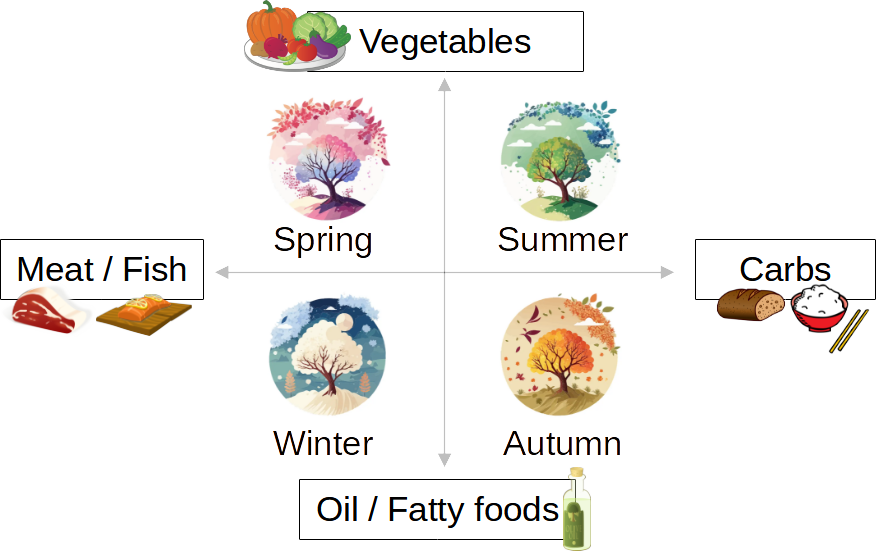After starting to cultivate my rationality, I suddenly became able to resolve various problems in my life. One example is my health. Let’s talk about it.
How to stay healthy
Sometimes, we have a difficult season in terms of physical state and want to stay healthy.
We often have our favorite and least favorite seasons. Which season do you like the most and least?
One of my acquaintances said she loved summer and didn’t like winter.

In my case, I prefer winter and am not good with summer. I am always physically ill in that season, especially around May. My weak liver causes poor health.
That is why we want to stay healthy in our least favorite seasons.
Fortunately, I recently realized that our dietary balance can cause it. It might be better to change the balance according to the seasons rather than pursuing a single ideal balance throughout the year. Today, I will introduce my current dietary balance theory, which I created and applied this month.
My new dietary balance theory
I applied a new dietary balance theory recently. It is a way to change the balance of foods we eat according to the seasons. I created this logic based on the Chinese traditional medical culinary culture. It is as follows:

- Spring: We eat more vegetables.
- Summer: We eat more carbohydrates, such as grains and beans.
- Autumn: We add more oil or fatty foods, such as vegetable oil and crops rich in fat.
- Winter: We eat more protein, such as meat and fish.
Changing balance with each season
This balancing can improve efficiency in terms of energy use.
In spring, we have to eliminate the liver fat accumulated during the winter. Excess body fat, including liver fat, is a burden.
Spring vegetables, which often have bitterness, help drain liver fat. Perhaps such a bitter taste of vegetables promotes the expulsion of liver fat. That naturally makes our weight decrease. It is healthy weight loss.
In summer, we increase carbs. They are energy efficient. That would be why we want sweet foods, fruits, and carbs this season. Moderate sweetness energizes us and doesn’t lead to unhealthy weight gain.

In autumn, in addition to carbs, we add more oily or fatty foods, such as vegetable oil, nuts, and fatty crops. They naturally give us a healthy weight. We prepare for winter.
In winter, we eat more meat and fish. This is because there are fewer vegetables in this season. Protein is also energy efficient. Moderate protein energizes us and doesn’t lead to unhealthy weight gain.
This logic made me realize a healthier way of eating. Although I used to apply a low-carb diet throughout the year, I have changed my dietary habits recently. Now I am increasing vegetables and carbs, even gradually.
In other words, a low-carb diet and a keto diet are suitable for winter. American junk foods are for autumn. Traditional high-carb diets are a summer style.
The reason for different seasonal preferences
This logic shows why we have different preferences for seasons, even partially.
I like meat and fish. I always ate them mainly. That is a winter way of eating. That explains why I have always had poor health in summer, especially early summer. Not enough vegetables prevented the elimination of my liver fat.
On the other hand, the people who like summer seem to prefer vegetables and carbs. They like sweets. It is a summer style of eating.
This logic also shows various reasons for our habits.

For example, in summer, we choose ice candies that are low in fat, like fruit ice candies. On the other hand, in winter, we prefer fat-rich ice creams, like vanilla and chocolate ice creams. Even the same frozen dessert can differ in our preferences.
We enjoy chocolate that contains high fat in winter. However, in spring, we don’t crave it so much (except for some chocolate enthusiasts).
A keto diet doesn’t catch on in tropical regions, while it is often seen in cold regions.
Conclusion
That is my current dietary balance theory.
It might be better to change the balance according to the seasons rather than pursuing a single ideal balance throughout the year.
This style might allow you to stay healthier.
Thank you for reading this article. I hope to see you in the next one.


